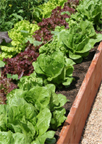What is organic gardening? Well, aside from no longer using fertilizers and pesticides, gardeners rely on compost, crop residue, crop rotation, integrated pest management and mechanical cultivation in order to preserve soil productivity and combat pests.
Currently, such organic gardening methods are regulated by the International Federation of Organic Agriculture Movements which helps farmers grow crops in 75 million acres of land across the globe.
Their goal can be summed up into two words - "sustainable development" - so the land being farmed will be around for the next generation.
Is organic gardening effective? The answer is yes. Over a 22 year study that was released to the public in 2005, the results showed that going back to the basics produces the same amount of corn and soybean yields as conventional methods. However, it does so by consuming less energy and without any pesticide residue.

The nice thing about organic gardening is that farmers are not the only ones that can do it - you too can make this happen in your own backyard. You just have to learn how to til the soil and keep it in good condition, how to make your crops grow and how to fight against pests so you will be able to harvest them.
You can even turn this into a hobby and see how much fun it is to grow your own vegetables instead of buying them from the grocery. Later on, we'll review a few books to learn how easy it is to do.